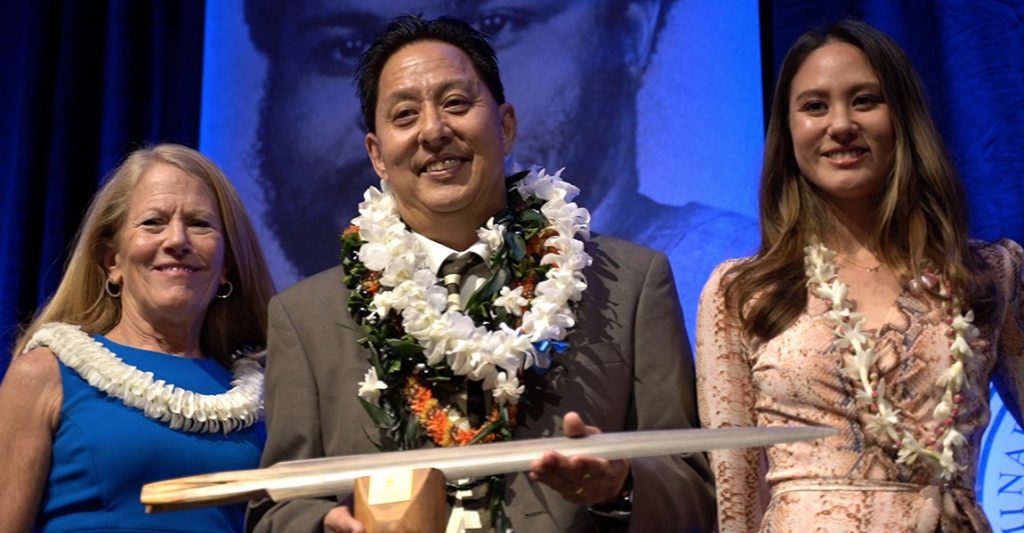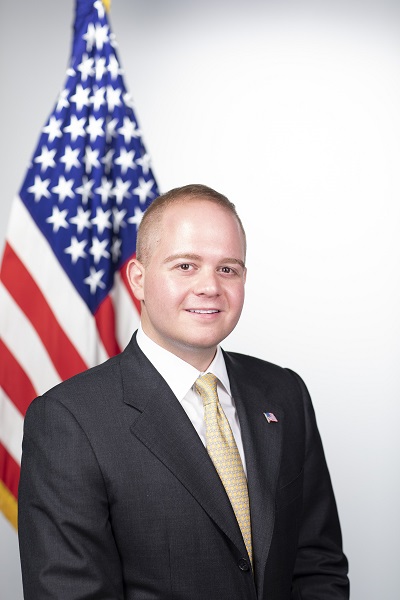It was an evening of Silversword pride – and celebration.
On February 20, some 350 people gathered at the Ala Moana Hotel for the 12th annual Intercollegiate Athletics Gala. The event honors the accomplishments of Chaminade’s student-athletes and recognizes all those who support the University’s strong athletics programs and facilities.
The gathering comes after a standout year for Silversword athletics.
In 2019, for the first time in five years, Chaminade’s men’s basketball advanced to an NCAA championship tournament. And the women’s volleyball team wrapped up the 2019 season with 22 wins.
The message at the gala: accomplishments like those aren’t possible without lots of community support.
“We are truly blessed,” said Curtis Coburn ’20, president of the Chaminade Student Athlete Advisory Committee, in his speech at the gala. He added that the challenges student-athletes overcome with the help of others promote self-growth and have “taught me that I can always work harder and I can always be just a little bit better. The situations we’ve faced will only make us more prepared.”
Coburn, who is on the University’s men’s golf and soccer teams, said it’s been an honor to be a Silversword. “I would like to begin by saying how thankful I am to be a Chaminade student-athlete,” he told the attendees. “The experience … would not be possible without the generous support from you.”
This year’s event included the induction of two titans in the Chaminade ‘ohana—Board of Regent member Dan Goo ’81 and the late Will “Mr. Chaminade” Pounds—into the Silversword Hall of Fame.

Goo has been serving the community for much of his life—as a member of law enforcement and a successful businessman. He’s also dedicated his time to Chaminade in a host of capacities, including as a member of the Board of Regents since 2008 and chairman of the University’s Development Committee.
And Goo is an ardent supporter of university athletics, making major gifts toward the university’s newly-constructed Coaching Offices and Silversword Training Center and Locker Rooms, state-of-the-art facilities that will ensure Chaminade Athletics can meet the demands of today and tomorrow.
“He’s interested in how he can help,” said Bill Villa, director of athletics at Chaminade.
Villa added: “He’s one of the nicest people you’ll ever meet.”
Goo spoke in a video at the gala, saying a cancer diagnosis when he was a young father helped him realize the importance of giving back to the community and working to improve other people’s lives.
“He believes that education can make a difference in the future of a young person,” said his wife, Judy.
“And he believes in the values of Chaminade.”

Pounds, the other 2020 Silversword Hall of Fame inductee, was also honored at the gathering.
He was one of the University’s most influential and dynamic players in the history of the Chaminade men’s basketball program, leading the University to an appearance in the NCAA Division III Quarterfinals in the 1978-79 season and becoming the first collegian in Hawaii to score 2,000 points.
He was also known for his generosity and kindness.
Former Silversword teammate Allan Silva said people gravitated to Pounds because he exuded incredible charm and positivity. “His attitude was never give up,” said Silva ’79. “We were blessed to have a guy like that on the team. He’s gone physically … but we’ve got him right here, in our hearts.”
That legacy still resonates with Silversword student-athletes and their coaches, about 40 of whom attended the intercollegiate gala. As always, all proceeds from this year’s event go right back into Chaminade’s athletics programs, including its 10 NCAA athletic teams with 140 student-athletes.











